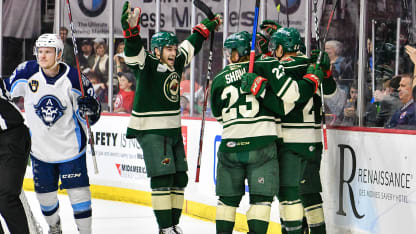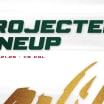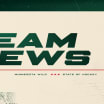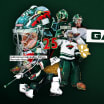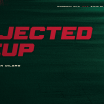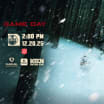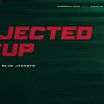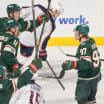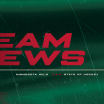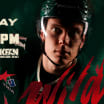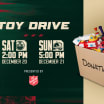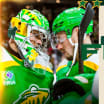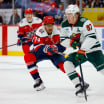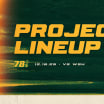"We are making the playoffs," Army recalled saying. "We're making it, we've worked too hard, we got here ... we're making it."
After two trying weeks, however, that end goal was much easier said than done.
Iowa's 2-0 win in Tucson on March 20 gave the Wild 80 points and put it right in the mix with both Chicago and Grand Rapids for first place in the division.
The team flew to Stockton, California for a two-game set against the Heat, one of the worst teams in the Western Conference.
In the first game there, Iowa came out rolling, putting up a 10-2 shots advantage early in the game. Shaw had a wide open net to shoot into, but Heat goalie Jon Gillies reached back and made a miraculous save with the paddle of his stick, keeping the game tied.
Eventually, Stockton would pull away.
Gillies' good fortune was just the beginning of the Wild's poor puck luck.
Two nights later, with the game tied late, the Wild had numbers exiting the defensive zone. A headsy clearing pass by Kyle Rau was about to put the Wild in on an odd-man rush, but it caught the stanchion and deflected back into the defensive end. Iowa was caught flat-footed, was never able to get back in position defensively and moments later, the Heat scored the winning goal with under a minute left in regulation.
A team that had become one of the best third-period teams in the AHL was, all of the sudden, melting down late in games.
Over the next five contests, the Wild was tied or within one goal in the third period in every single game ... and earned just one point for its troubles.
"It was really frustrating. It just seemed like everything was working against us," said Wild forward Sam Anas. "Crazy bounces, tough calls, it just seems like we'd find a way to lose in the third."
Want more Wild headlines? [Sign up for e-News]
The blowout in Milwaukee followed that and was the only game among the eight that Iowa never really had a chance to win.
So Army sat his team down and had a frank discussion.
"I wanted to let them know that, 'It wasn't as bad as you think,'" Army said. "We had a chance in each game and just didn't get it there. We had to push a little bit harder and give just a little bit more."
Army believes his team simply ran out of gas.
With one of the AHL's most demanding travel schedules, the Wild was also without forward Matt Read, who by then was up with Minnesota. Justin Kloos, the team's leading scorer early in the season, was gone, traded to Anaheim in mid-January. Joel Eriksson Ek had been recalled to the big club after Mikko Koivu's knee injury.
Captain Cal O'Reilly and Kyle Rau, arguably the team's top two players, were playing 27 or 28 minutes per night out of necessity, but that wear and tear was showing. Those are numbers unheard of from forwards, but the team was so shorthanded, Army didn't have a choice.
A team that had thrived in third periods had nothing left to give during the most important stretches.
"They were playing too much," Army said. "We were a great third-period team all season because we skate and we're well-conditioned. All of those games we had chances in late, but we just got tired."
The team needed a jump, and got it, just in time.
With a must-win game looming in Grand Rapids, Luke Kunin, Jordan Greenway and Ryan Donato arrived on the scene to give Iowa some crucial reinforcements.
It helped that those three also made a heck of a first impression: Kunin netted a hat trick, Donato had a five-point game and Greenway had a pair of assists as Iowa got the losing taste out of its mouths in a 7-3 victory.
